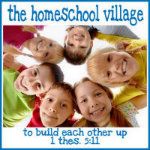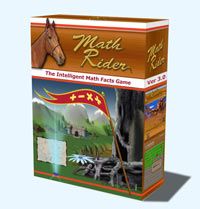If you had asked me to write this article a year ago it would have been written totally differently to what I have written for you today. I have been reading Teaching the Trivium and am so glad that I did. I discovered this article in the appendix and am pleased to say that it is on line in its entirety History and Research on the Teaching of Math (TTT page 540-557)
This article is incredibly eye opening and will empower you to make better choices in how you approach teaching math in your home school. Most of us make choices regarding how and when to teach math based upon what we did at school (and for a few of us at home). This article will turn your thinking of math teaching on it's head.
Some interesting points
- . . . early childhood may simply be an inefficient period in which to try to teach skills that can be relatively quickly learned in adolescence. (Prime Time for Education: Early Childhood or Adolescence ? by W.D.Rohwer, Jr)
- Mathematics in every form is a subject ill-fitted to the child mind. It deals not with real things, but with abstractions. When referred to concrete objects, it concerns not the objects themselves, but their relations to each other. It involves comparison, analysis, abstraction . . . (Cyclopedia of Education p.208 William H Burnham)
- . . . successful school achievement in areas requiring use of concepts - such as numbers, classes, and spatial and causal relationships - correlated highly with mental age. Developing these concepts was especially associated with success in arithmetic, problem solving, and spelling. (Feyberg)
Somewhere around the age of 12 the brain switches to mainly using/developing the three dimensional aspect of thinking. Mathematics is a highly three dimensional abstract practice. This has a number of implications on the learning of math for the child. This may be the reason students to struggle with math at around the age of 12. One of the reasons is that the brain is now using a new area and does not go to the 'linear' area to fetch the necessary information. The brain now recognizes that math aught to be stored in this new '3D' area. This is one of the reasons a lot of students develop a negative attitude towards maths because they struggle to retrieve the relevant information because it's been stored in the incorrect part of the brain.
Here is why we need this 3D stage of development in order to learn/do math
"The reason why it requires a higher activity of thought to think quantity [abstract number] and understand mathematics than it does to perceive quality (or things and environments) [physical objects] lies right in this point. The though of quantity is a double thought. It first things quality [object] and then negates it. or thinks it away. In other words, it abstracts from quality. It first thinks thing and environment (quality), and then thinks both as the same in kind or as repetitions of the same. A thing becomes a unit [number] when it is repeated so that it is within an environment of duplicates itself [number among numbers]." (The Teaching of Mathematics in the Elementary and Secondary School by J.W.A. Young)
What I am going to do differently
The biggest impact for me reading this chapter is that I am not going to force Sir N through many home school arithmetic books. I am going to slow down and do a lot more hands on practical math (lots of manipulative's) with him. I am going to wait until around the age of 10 to introduce more complex topics.
If I wait till then I know that he will easily learn and it will be a faster learning for him, less stress for me and him and I know that he will not struggle because his brain is developmentally ready to tackle this fundamentally difficult subject. There is plenty of research evidence that shows that children who start math at the age of 12 can learn in under 6 months the six years of math that students have learned starting math at the age of 6.
Small children cannot understand many arithmetic concepts at an early age. We can teach them to perform the process, but we cannot make them understand the concepts - Harvey Bluedorn TTT page 556
The mathematical process may not be introduced before there is a considerable stock of qualitative facts in the child's mind on which to work, and not until the child's mental powers are sufficiently developed to take the steps implied in even the simplest mathematical concept. It is a question whether we are not tending to introduce the abstractions of mathematics too early. (The Teaching of Mathematics in the Elementary and Secondary School by J.W.A. Young)
Knowing that now is the optimum time for Sir N to learn route concepts we will memorize math facts and concrete learning via games, commercial activity (shopping), cooking, measuring etc. We will also continue experiencing life via field trips in order to build his vocabulary and concrete understanding of the world around him.
Scope and Sequence
A little word on scope and sequence as this is important to consider when changing the math program you are using. Scope refers to the content. In other words these are the topics covered(A to Z)
Sequence is the order in which the scope is taught (IE the order in which things are covered within the program)
It is important to know this about your math product or you might end up redoing math your child is already familiar with or you might end up skipping a whole lot of important content that your child needs in order to succeed at math.
On the WWW
- Jimmie's Collage has some great resources for math
Ultimate List of Printable Math Manipulatives
10 Best Online Game Sites for Home school Math
Understanding the Why of Math: A Quote by Charlotte Mason - John Bennett - Why Math Instruction Is Unnecessary on YouTube
- On Pinterest Maths and Math (Worksheets)
- YouTube
- Teaching Textbooks (This is my favourite math program by far)
- TouchMath
- Abeka
- A+ TutorSoft
- Math Rider
- Saxon Math
- Singapore Math
- Horizons Math
 |
| Source |
I have been so encouraged, inspired and awed by the other bloggers who are contributing to this series and would highly recommend that you grab a cup of tea and take some time to read their thoughts on the subjects we have been sharing on. I have been on this journey of home education for 15 years now and their thoughts and insights are inspiring and encouraging me.
Blessings
Chareen
This week
- Bernadette shares a traditional look at Doing 'Rithmetic
- Julie ponders on Why do we study math? and has found some real life applications for math.
- Hwee shares some thoughts on how Maths in Our Home has evolved.
- Savannah confesses about Math and Tears; When Mom Learned a Lesson some Math teaching tips
---ooOoo---
Linking with






















